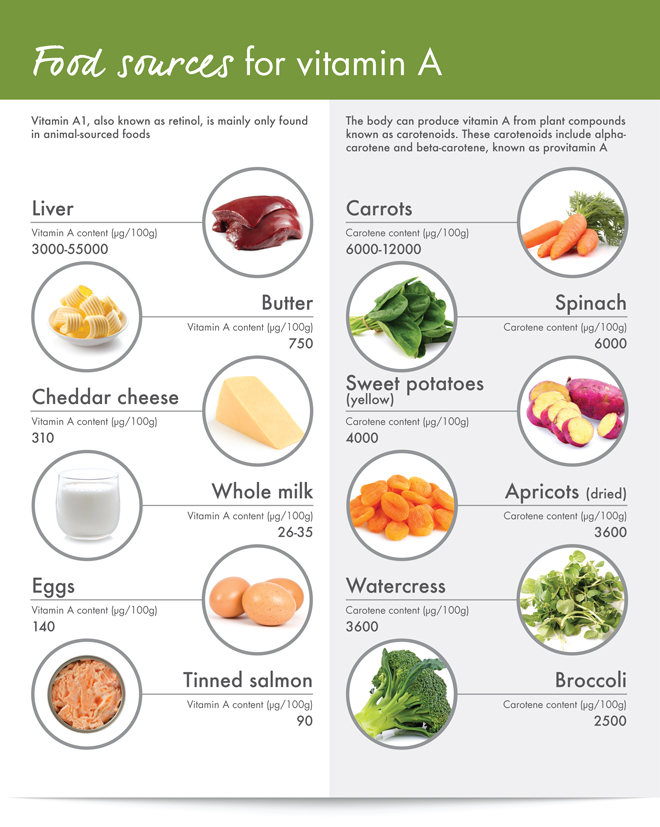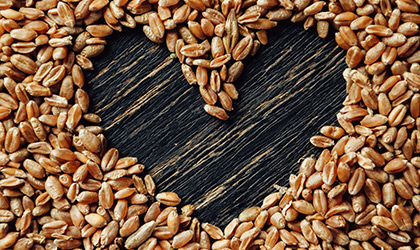
Vitamin A is critical to good health, playing a role in growth and development, vision, immune function, and reproduction. Here, we take a closer look at how this nutrient operates in the body.
What is vitamin A?
Vitamin A is an essential vitamin, meaning it supports normal functioning but can’t be synthesised by the body.
There are two types of vitamin A: retinoids (preformed vitamin A derived from animal products) and carotenoids (provitamin A derived from plants). The liver converts both forms of vitamin A into retinol.
Is vitamin A the same as retinol??
Retinol is a type of retinoid found in vitamin A. ‘Retinoid’ is an umbrella term for any vitamin A derivative; retinol is just one many retinoids.
Are vitamin A and beta-carotene the same??
Beta-carotene is a precursor to vitamin A. The body turns beta-carotene into vitamin A as per its needs.
How much vitamin A do I need?
According to the NHS, adults require the following amounts of vitamin A:1
-
Men: 700µg
-
Women: 600µg
What food contains sources of vitamin A?
Vitamin A is naturally present in a number of foods. Sources of vitamin A include eggs, milk, yoghurt, cheese, oily fish, liver and liver products (if you’re pregnant, you should avoid these), and fortified low-fat spreads.
You can also increase your vitamin A intake by eating more sources of beta-carotene, which the body then converts into vitamin A. The main dietary sources of beta-carotene are:
-
Yellow fruit, like papaya, apricots, and mango
- Yellow, red, and dark green (leafy) vegetables, such as carrots, sweet potatoes, red peppers, and kale

What does vitamin A do for the body?
Vitamin A has a number of important functions in the body. It contributes to:
-
Normal iron metabolism
-
The maintenance of normal mucous membranes
-
The maintenance of normal skin
-
The maintenance of normal vision
-
The normal function of the immune system
Vitamin A also has a role in the process of cell specialisation.
What are the symptoms of a vitamin A deficiency?
While a vitamin A deficiency is extremely rare in the Global West, it’s more widespread in the Global South. In low-income countries, for instance, a vitamin A deficiency is the leading cause of preventable blindness.
Other symptoms of a vitamin A deficiency include:
-
Dry skin
-
Night blindness
-
Dry eyes
-
Trouble conceiving and infertility
-
Stunted growth
-
Poor wound healing
-
Chest infections
-
Breakouts
What does vitamin A do for your skin?
Since vitamin A contributes to the maintenance of normal skin, you can often find it in many cosmetic products, like moisturisers and anti-ageing creams. Commonly referred to as retinol in the beauty world, vitamin A is widely used for breakouts and fine lines.
Does vitamin A help hair growth?
Every cell in the body needs vitamin A for proper growth and development. And this includes your hair, which is one of the fastest-growing tissues in the body.
Why is vitamin A important for your vision?
You may be familiar with the idea that eating carrots can help you see in the dark. And this notion isn’t entirely folkloric. The main nutrient found in carrots is beta-carotene, a precursor for vitamin A, which supports your vision in dim light.
Want to learn more about looking after your vision? Head over to our dedicated Eye Health Hub for more information.
Vitamin A and immune system
Vitamin A supports immune function by helping maintain normal mucous membranes in the lungs, throat, nose, and mouth, which trap bacteria and other pathogens.
Vitamins A is also involved in the production of white blood cells, which help the body fight infection and other diseases.
Vitamin A and reproduction
Owing to its role in cell specialisation, vitamin A helps maintain a healthy reproductive system in men and women. It may also support embryonic growth and development during pregnancy.
However, it’s worth mentioning that consuming too much vitamin A in pregnancy may harm a growing baby. For this reason, women are advised against eating foods with highly concentrated amounts of vitamin A, such as liver and pâté.
To find out more about vitamin A, feel free to have a chat with one of our expert Nutrition Advisors, or click the chat button located at the bottom right-hand of our website.
References:
- Vitamins and minerals - Vitamin A. (2021). https://www.nhs.uk/conditions/vitamins-and-minerals/vitamin-a/
You Might Also Like

Keri
Keri Filtness has worked in the Nutrition Industry for 19 years. She is regularly called upon for her professional comments on health and nutrition related news. Her opinions have been featured by BBC3, Prima, Vitality, The Mirror, Woman’s Own and Cycling Weekly, amongst others. She has also worked one to one with journalists, analysing their diets and health concerns and recommending changes and additions, where appropriate.
View More



